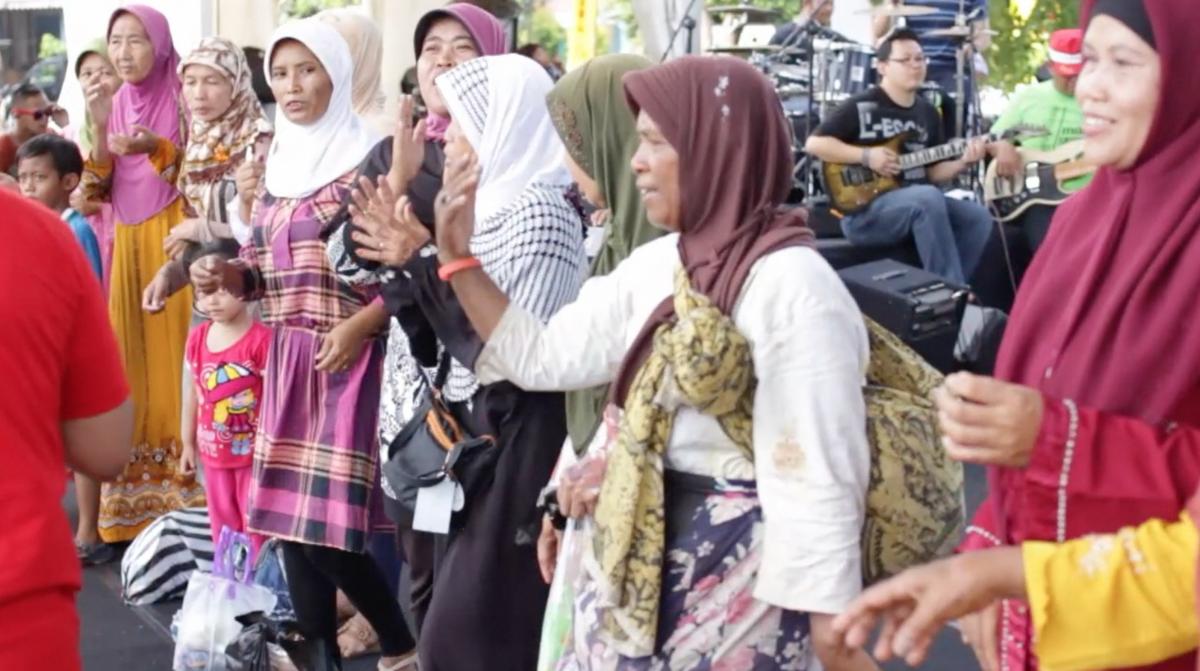How do our member churches express the MWC Shared Convictions in beautiful, local variety throughout our global body?
The October 2016 issue of Courier/Correo/Courrier seeks to discern the variety of reasons why Anabaptist communities from around the world come together to form MWC. In the articles that follow, writers reflect on the question: How does Christ’s love for us motivate and guide our response to strangers in our local context?
Holistic care in Semarang
In the largest Muslim-majority country in the world, Indonesia, the Mennonite church responds to the needs of the community across religions and class with holistic care, supported by local government institutions and religious institutions.
The church witnesses to God’s love and grace by welcoming its Muslim brothers and sisters and people from various religions. “They are not enemies; they are those who need God’s love and help, just as we all do,” says Victor Purnomo. He is a pastor of Jemaat Kristen Indonesia Injil Kerajaan (Gospel of the Kingdom Church, Indonesian [Mennonite] Christian Fellowship). “Without the walls of hatred or anger, the church is able to work creatively to reach the needs of the city and ultimately the hearts of its people.” Churches like JKI Injil Kerajaan build their ministry on good relations with the local citizens. Reaching out to the levels in society with the most need, the church has found this population quick to respond openly and gratefully.
Holistic care
The church’s holistic care includes offering academic scholarships for children through Sekolah Terang Bangsa (Light of the Nations School), the church-run elementary, junior high, senior high school. This ministry has opened up the hearts of many parents: “If you can love the children, the parents will be very proud because their children are being cared for and valued,” says pastor Victor.
The church also reaches out to its neighbours through social ministries like disaster relief. “The church needs to be the most sensitive to the needs of its city. We provide the answer for them,” says Victor. “When there is a fire, we are the first to provide food. That really touches them. At the point they have nothing, there is the church responding.” This also builds relationship with the government.
The officials have specifically asked for assistance because of the available facilities. During recent floods, churches sent volunteers on rafts filled with food and supplies. People across different religions have said, “The church is amazing. Our own people do not even care this much for us, yet the church is the first to help.”
Healing prayer
Other social ministries occur in the open-air markets where rice, vegetables, cooking oil, clothing and other supplies are sold below the normal price. Here, the church shares the gospel and offers prayer for healing. Not planned to be a crusade, these events focus more on sharing godly values.
Participants from the church sing secular songs with positive value or national pride, as well as Christian songs that do not explicitly name Christ. There is a time of prayer for the sick, when at last the people find out that it is the Lord Jesus who healed them. In their time of need, they do not mind who does the healing as long as they are healed.
Thousands have committed their lives to Christ through these events in the market. The church openly supports social ministries like food distribution during the evenings of Ramadan (Muslim month of fasting). Feeding more than a thousand people each day for four weeks a year, the satellite church in Permata Hijau (Green Diamond area of Semarang) has opened up its doors for gatherings, games, prizes and stories from God’s Word.The sick are healed and miracles bring people to Christ. Supporters, seeing the effect and fruit of the ministry, willingly provide funding and provisions from their own businesses.
Respectful reputation
In Pondok Pesantren (Islamic boarding schools), the church volunteers come wearing religious head coverings as guests who respect their neighbours in faith. They share about values like having vision, love and forgiveness. In turn, Islamic boarding schools have asked to attend the church Christmas gatherings. After praying according to their own faith tradition, these Muslims sit to listen to the Christmas programs. Students mentioned that their Christian friends are good, not forcing them into Christianity, but giving good values that they can learn from.
This has piqued their interest. When schools join events located at the church, we freely share Jesus. Even police officers have openly supported the church. When religious extremists threatened the church in Semarang, the police were the first to notify the church leaders and send help. When churches like JKI Injil Kerajaan were accused of “Christianization,” the church responded that they are helping society in poverty.
They maintained peaceful communication. Others reported that the church does not force itself on others. The police then defended the church. Strong networks and relationships between the church and other institutions are essential.
The church must be more than an organization that leads services among the Christian community. Its potential includes building bridges for those in the city to know Christ through holistic service. The great commission (Matthew 28:18–20) is to share the gospel to all the world with the great commandment in mind, that we would love God and our fellow people (Matthew 22:35–40). It is not a matter of debating which commandment is the most essential, but allowing them to walk hand in hand.
— Lydia C. Adi serves as the international relations representative for the Jemaat Kristen Indonesia Synod. She holds master’s degrees in cross-cultural studies (Fuller Theological Seminary, USA) and Teaching English to Speakers of Other Languages (Biola University, USA). Together with her husband Anton K. Sidharta, network pastor at JKI Maranatha in Ungaran, they have founded the Unlimited Fire JKI Youth Network and have bridged relations with churches across denominations and countries. Anton and Lydia live in Ungaran, Indonesia with their son, Caleb.
This article first appeared in Courier/Correo/Courrier October 2016
